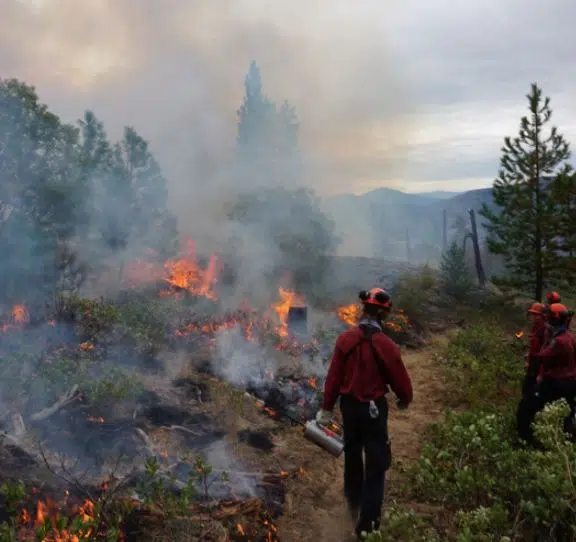
BC Wildfire Crews in August 2020. (Photo via BC Wildfire Service)
Premier John Horgan says government officials are in talks with the United States and Australia about potential support as the province continues to fight some 300 wildfires currently burning.
However, the COVID-19 pandemic and the wildfire situation elsewhere is limiting the help that is available to British Columbia.
Speaking from Castlegar Wednesday, Horgan said B.C. has “all of the resources we need on the ground” when it comes to fighting the fires, but noted if more were available “we would take them.”
“In Australia, they’re on lockdown at the moment [due to COVID-19]. We had commitments from them for equipment and management personnel, and that’s very helpful, but we’re just going to have to wait and see,” Horgan said.
“The challenges here in British Columbia are being felt in Washington, Oregon and California…so the resources that we would have relied on in the past are occupied in their home jurisdictions when it comes to the U.S.”
Further, crews from the Eastern United States are already busy fighting fires in Ontario.
“We’re not expecting U.S. resources any time soon and our friends in Australia and New Zealand are focused on COVID,” Horgan added. “We are not alone in this challenge, we are sharing it, regrettably, with our neighbours.”
B.C. Public Safety Minister, Mike Farnworth, echoed a similar sentiment yesterday, when he declared a provincial state of emergency due to wildfires – the third such declaration in the past five summers.
“I can tell you that we have been in touch with Australia,” he said. “They have particular COVID issues themselves at the moment and we are working with them, but there’s not been, at this point, a commitment to have firefighters come here from Australia.”
While there are resources from other provinces on the ground, Farnworth also admitted that drawing in support from the rest of Canada has not been easy either.
“There are protocols in place. There’s the Canadian Interagency Forest Fire Centre in Winnipeg which coordinates the deployment of resources and other provinces, in particular New Brunswick and Ontario and Quebec at the present time,” he added. “It’s been in place for quite some time.”
A team of 100 firefighters from Mexico are arriving into B.C. on Saturday. These firefighters will be tested for COVID before they board the plane and again after they land in Abbotsford. They will also sleep in camps separate from BC firefighters.
“COVID-19 protocols in place and they are coming in on Saturday and they will be going straight to the hot zones in teams of – five teams of – 20,” Farnworth said.
More than 3,000 firefighters and support staff are on the fire lines in British Columbia with the federal government also sending 350 Canadian Armed Forces members to help with the wildfire efforts.
Horgan says the wildfires have ignited just as British Columbia’s tourism industry was hoping to begin its recovery from the pandemic, but he promised the province will work with industry and labour groups to support them.
“For those who are living through yet another horrific fire season, this is a graphic reminder of how climate change is with us not just intermittently but all the time,” Horgan said. “We are in an early, early fire season. We’ve got weeks, perhaps months to go of very challenging circumstances.”
For now, the evacuation orders and alerts – and the number of people displaced – is not near the record-breaking 2017 and 2018 fire seasons, but that’s not to say it won’t get there, if the situation does not improve in the near future.
“We need to make sure we can mobilize resources prior to an evacuation order being issued in a region, and that means working with the hospitality sector, working with post-secondary institutions – Thompson Rivers University for example – and other institutions in the Interior that have housing available,” Horgan added.
“We want to be able to direct people to those locations. That’s what we’ve done in the past and that’s what we anticipate we’ll do as the season progresses.”
As for people who have trips planned in areas that are at risk of fire, Horgan says to check with local resources like hotels to ensure it’s safe to travel before leaving home.
– With files from The Canadian Press













